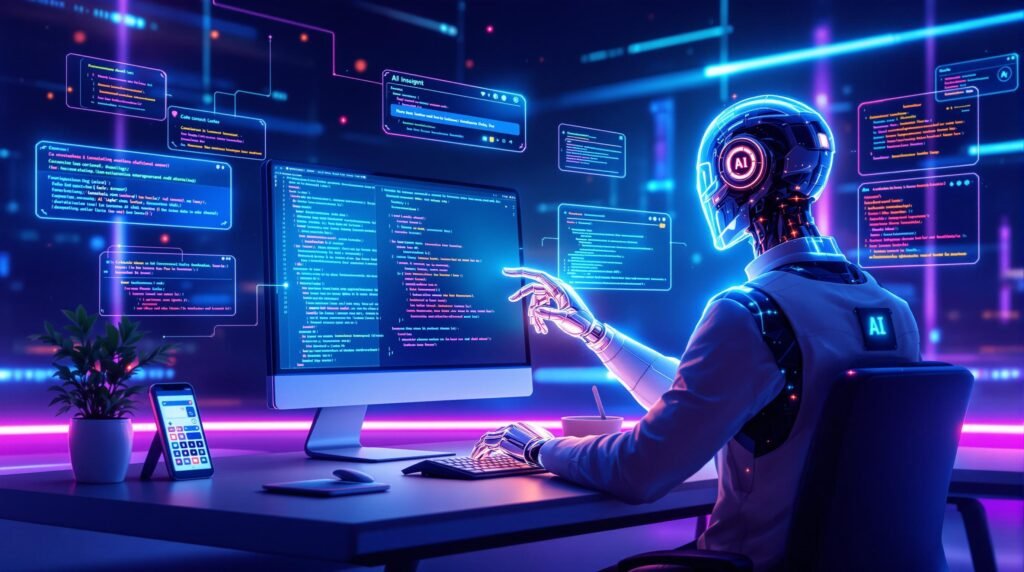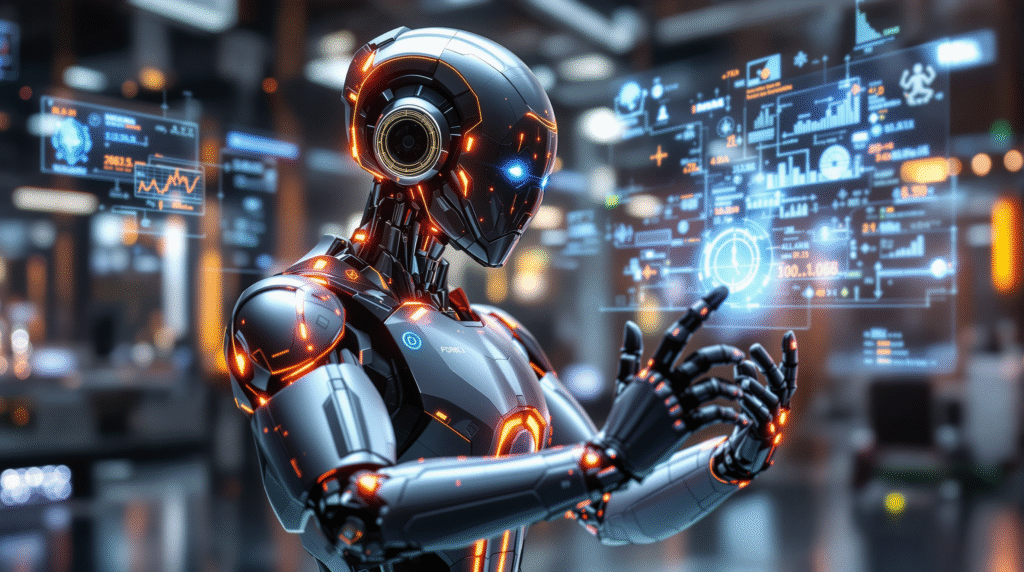Introduction: The Rise of AI Agents in Programming
In recent years, the programming landscape has undergone a significant transformation thanks to the rapid development of artificial intelligence. AI agents—intelligent software entities capable of learning, reasoning, and interacting—are now becoming indispensable tools for developers. Their presence is felt in every stage of the software development lifecycle, from writing and reviewing code to testing, deployment, and maintenance.
The rise of AI agents in programming is driven by the need for greater efficiency, higher code quality, and faster delivery of software products. As projects grow in complexity and teams become more distributed, AI agents offer a way to automate repetitive tasks, provide instant feedback, and support developers in solving challenging problems. This shift is not just about automation; it’s about augmenting human creativity and expertise with intelligent assistance, enabling programmers to focus on innovation and complex design rather than routine work.
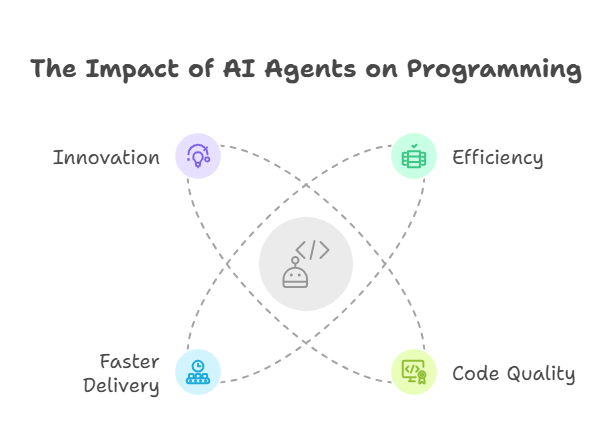
What Are AI Agents? Key Concepts for Developers
AI agents are autonomous or semi-autonomous software systems designed to perceive their environment, process information, and take actions to achieve specific goals. In the context of programming, these agents can analyze code, understand developer intent, and offer context-aware suggestions or corrections.
Key concepts for developers include autonomy, learning, and adaptability. Autonomy means that AI agents can operate with minimal human intervention, making decisions based on the data and context they receive. Learning refers to their ability to improve over time, often using techniques such as supervised learning, reinforcement learning, or large language models trained on vast codebases. Adaptability ensures that agents can adjust their behavior to different programming languages, frameworks, and individual coding styles.
Modern AI agents for developers are often powered by advanced machine learning models, such as transformers, which enable them to understand code semantics, detect patterns, and generate human-like suggestions. They can be integrated into popular development environments, acting as copilots that assist with code completion, error detection, documentation, and even automated testing. For programmers, understanding how these agents work and how to collaborate with them is becoming an essential skill in the evolving world of software development.
Common Coding Challenges and How AI Agents Address Them
Developers face a variety of challenges in their daily work, from maintaining consistent code style and identifying hidden bugs to understanding complex legacy code. Here are some of the most common issues and how AI agents help solve them.
For example, inconsistent code style can make code reviews harder and increase the risk of errors, but AI-powered linters and refactoring suggestions help enforce best practices automatically. Hidden bugs and edge cases often lead to costly production issues, yet AI agents can detect anti-patterns, anomalies, and even generate unit tests to catch problems early. Lack of documentation slows down onboarding and knowledge transfer, but AI agents can generate docstrings, module summaries, and even dependency diagrams. When dealing with legacy code, AI agents can explain code sections and recommend refactoring steps, making maintenance less daunting. For performance optimization, AI-driven profiling tools and algorithmic suggestions help identify and resolve bottlenecks.
Example: Quick Code Review Agent
python
# ai_code_review.py
# A simple agent that sends a code snippet to a language model
# and returns a list of suggestions for improvements or detected issues.
import os
import openai
openai.api_key = os.getenv("OPENAI_API_KEY") # Set your API key as an environment variable
def review_code(snippet: str, model: str = "gpt-3.5-turbo") -> str:
system_msg = "You are an experienced Python reviewer. Identify bugs, style issues, and suggest improvements."
user_msg = f"Here is the code snippet:\n```python\n{snippet}\n```"
response = openai.ChatCompletion.create(
model=model,
messages=[
{"role": "system", "content": system_msg},
{"role": "user", "content": user_msg}
],
temperature=0.2,
max_tokens=400
)
return response.choices[0].message.content.strip()
if __name__ == "__main__":
code_example = """
def add_items(lst, item):
if not item in lst:
lst.append(item)
return lst
return lst
"""
suggestions = review_code(code_example)
print("==== Suggestions ====")
print(suggestions)Running this script will display a report with detected issues (such as using not in instead of item not in) and suggestions for refactoring or adding tests.
Code Generation and Autocompletion: Smarter, Faster Development
AI agents increasingly act as copilots in code editors, suggesting lines of code, generating entire functions, or even creating complete test modules. This brings three main benefits: faster coding thanks to multi-line suggestions, higher code quality by leveraging best practices learned from large code corpora, and fewer context switches since developers don’t need to leave their IDE to look up examples or documentation.
How does it work? Generative models like CodeT5, StarCoder, or GPT-4o are trained on billions of lines of code and can predict the next lines based on the current context. IDEs such as VS Code or JetBrains integrate these models via APIs, providing real-time suggestions as you type.
Example: Autocompletion with an Open-Source Model
python
# code_autocomplete.py
# Uses a HuggingFace model to generate code completions.
from transformers import AutoTokenizer, AutoModelForCausalLM, pipeline
MODEL_NAME = "bigcode/starcoderbase-1b" # Lightweight model for demonstration
tokenizer = AutoTokenizer.from_pretrained(MODEL_NAME)
model = AutoModelForCausalLM.from_pretrained(MODEL_NAME)
generator = pipeline("text-generation", model=model, tokenizer=tokenizer)
prompt = """\
def fizz_buzz(n: int) -> list[str]:
\"\"\"Return list where multiples of 3 are 'Fizz', 5 are 'Buzz',
and both 3 and 5 are 'FizzBuzz'.\"\"\"
"""
# Generate the next 40 tokens
outputs = generator(prompt, max_new_tokens=40, do_sample=True, temperature=0.1)
print(outputs[0]["generated_text"])When you run this script, the model will generate the body of the fizz_buzz function, including the loop and conditions, saving you time on boilerplate code.
AI Agents in Code Review and Bug Detection
Code review and bug detection are critical stages in the software development lifecycle, ensuring that code is reliable, maintainable, and free from errors before it reaches production. Traditionally, these processes rely on manual inspection by experienced developers, which can be time-consuming and prone to oversight, especially in large or fast-moving projects. AI agents are transforming this space by automating many aspects of code review and bug detection, making the process faster, more consistent, and less dependent on individual expertise.
Modern AI agents can analyze code for common mistakes, security vulnerabilities, and deviations from best practices. They use machine learning models trained on vast repositories of open-source and enterprise code to recognize patterns that often lead to bugs or performance issues. For example, an AI agent can flag potential null pointer exceptions, detect unused variables, or identify code that may be vulnerable to injection attacks. Some agents go further, suggesting specific fixes or even automatically applying them, subject to developer approval.
Beyond static analysis, AI agents can also generate and run test cases, helping to uncover edge cases that might be missed during manual testing. By continuously learning from new code and feedback, these agents become more effective over time, adapting to the unique style and requirements of each project. As a result, teams benefit from higher code quality, reduced technical debt, and faster release cycles.
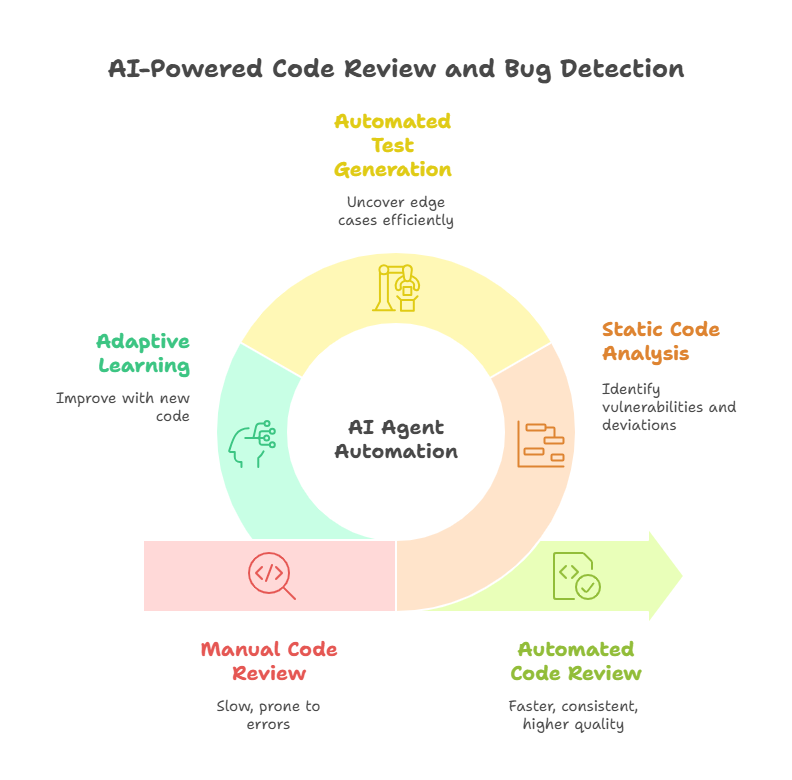
Refactoring and Optimizing Code with AI Support
Refactoring is the process of restructuring existing code without changing its external behavior, with the goal of improving readability, maintainability, and performance. Optimization focuses on making code run faster or use fewer resources. Both tasks are essential for long-term project health but can be daunting, especially in large or legacy codebases. AI agents are increasingly valuable partners in these areas, offering intelligent suggestions and even automating parts of the process.
AI-powered refactoring tools can identify code smells—patterns that indicate potential problems, such as duplicated code, overly complex functions, or poor naming conventions. They can recommend or perform actions like extracting methods, renaming variables, or simplifying logic. For optimization, AI agents can analyze code execution profiles, suggest more efficient algorithms, or highlight bottlenecks in resource usage.
For example, an AI agent might detect that a nested loop can be replaced with a more efficient data structure, or that a function can be memoized to avoid redundant calculations. These agents can also help ensure that refactoring does not introduce new bugs by automatically generating and running regression tests.
Example: Automated Refactoring Suggestion
python
# ai_refactor.py
# Simple example of using an AI agent to suggest refactoring for a given code snippet.
import os
import openai
openai.api_key = os.getenv("OPENAI_API_KEY") # Set your API key as an environment variable
def suggest_refactor(snippet: str, model: str = "gpt-3.5-turbo") -> str:
system_msg = "You are a senior Python developer. Suggest refactoring improvements for the following code, focusing on readability and efficiency."
user_msg = f"Here is the code snippet:\n```python\n{snippet}\n```"
response = openai.ChatCompletion.create(
model=model,
messages=[
{"role": "system", "content": system_msg},
{"role": "user", "content": user_msg}
],
temperature=0.2,
max_tokens=400
)
return response.choices[0].message.content.strip()
if __name__ == "__main__":
code_example = """
def get_even_numbers(nums):
result = []
for n in nums:
if n % 2 == 0:
result.append(n)
return result
"""
suggestions = suggest_refactor(code_example)
print("==== Refactoring Suggestions ====")
print(suggestions)Integrating AI Agents into Your Development Workflow
Integrating AI agents into your development workflow can significantly enhance productivity and code quality, but it requires thoughtful planning and the right tools. The first step is to identify which parts of your workflow can benefit most from automation and intelligent assistance. Common integration points include code editors (such as VS Code or PyCharm), version control systems, continuous integration pipelines, and code review platforms.
Many modern IDEs now offer built-in or easily installable AI-powered extensions that provide features like code autocompletion, real-time error detection, and documentation generation. For example, tools like GitHub Copilot or Tabnine can be added directly to your editor, offering context-aware suggestions as you type. In code review, AI agents can be integrated with platforms like GitHub or GitLab to automatically comment on pull requests, flagging potential issues or suggesting improvements before human reviewers even look at the code.
For teams using continuous integration and deployment (CI/CD), AI agents can be configured to run automated code analysis, generate test cases, or even block deployments if critical issues are detected. Integrating these agents into your workflow not only saves time but also helps enforce coding standards and catch problems early, reducing the risk of bugs reaching production.
To maximize the benefits, it’s important to ensure that AI agents are well-configured for your project’s specific needs. This might involve customizing their rules, training them on your codebase, or setting up feedback loops so they learn from your team’s preferences. The goal is to create a seamless collaboration between human developers and AI agents, where the agents handle repetitive or error-prone tasks, freeing up developers to focus on creative problem-solving and innovation.
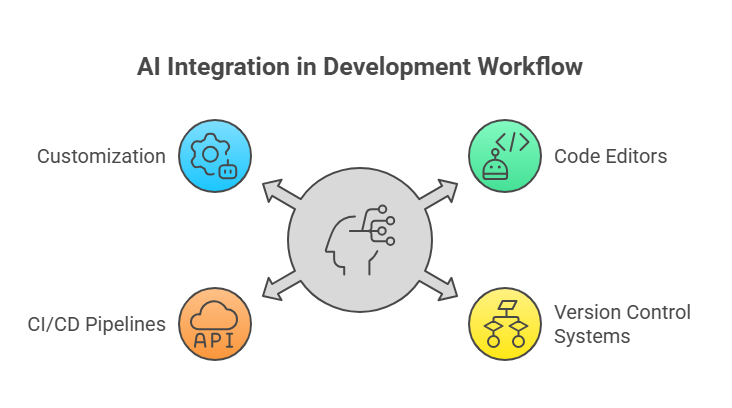
Best Practices for Collaborating with AI Agents
Effective collaboration with AI agents requires more than just installing a plugin or running a script. To truly harness their potential, developers and teams should adopt a set of best practices that foster trust, transparency, and continuous improvement.
First, treat AI agents as partners rather than replacements. Use their suggestions as starting points, but always review and understand the changes before accepting them. This not only ensures code quality but also helps developers learn from the agent’s recommendations. Encourage team members to provide feedback on the agent’s performance—most modern tools allow you to rate suggestions or flag incorrect outputs, which helps improve the underlying models over time.
Transparency is key: make sure everyone on the team understands what the AI agent does, how it makes decisions, and what data it uses. Document the integration process and any custom configurations so that new team members can quickly get up to speed. Regularly review the agent’s impact on your workflow, tracking metrics like reduced bug rates, faster code reviews, or improved onboarding times.
Finally, stay up to date with the latest developments in AI tooling. The field is evolving rapidly, and new features or models can offer significant improvements. By fostering a culture of experimentation and learning, your team can continuously refine how you work with AI agents, ensuring that they remain valuable allies in building high-quality software.
Example: Integrating an AI Agent with a Code Editor
Here’s a simple example of how you might integrate an AI-powered code completion tool into your workflow using Visual Studio Code:
Install the GitHub Copilot extension from the VS Code marketplace.
Sign in with your GitHub account and enable Copilot for your projects.
As you type, Copilot will suggest code completions and even entire functions based on your context.
Review the suggestions, accept or modify them as needed, and provide feedback to help improve the tool.
Real-World Examples: Success Stories from Developers
AI agents are no longer just experimental tools—they are actively transforming the way developers work across the globe. Many teams and individual programmers have shared success stories that highlight the tangible benefits of integrating AI agents into their workflows.
For instance, a fintech startup used an AI-powered code review agent to automatically scan pull requests for security vulnerabilities and style inconsistencies. This not only reduced the number of bugs reaching production but also sped up the review process, allowing developers to focus on more complex tasks. In another case, a large e-commerce company adopted AI-driven test generation tools, which automatically created unit tests for new features. This led to higher test coverage and fewer regressions, even as the codebase grew rapidly.
Freelance developers and small teams have also benefited from AI agents that generate documentation and suggest code optimizations. By automating these time-consuming tasks, they can deliver projects faster and with greater confidence in code quality. Some open-source projects have reported that AI agents helped onboard new contributors by generating clear explanations of complex code sections, making collaboration smoother and more inclusive.
These real-world examples demonstrate that AI agents are not just theoretical helpers—they deliver measurable improvements in productivity, code quality, and team satisfaction. As more developers share their experiences, the community continues to discover new and creative ways to leverage AI agents for better software development.
Challenges and Limitations of AI Agents in Coding
Despite their many advantages, AI agents are not without challenges and limitations. One of the most significant issues is the risk of over-reliance. Developers may be tempted to accept AI-generated suggestions without fully understanding them, which can lead to subtle bugs or security vulnerabilities slipping into the codebase. It’s crucial to maintain a healthy balance between trusting the agent and applying human judgment.
Another challenge is the quality and relevance of AI suggestions. While modern models are highly capable, they can still produce incorrect, inefficient, or outdated code, especially in niche domains or when working with new technologies. AI agents also require high-quality training data and regular updates to stay effective, which can be a barrier for organizations with unique or proprietary codebases.
Privacy and security are additional concerns, particularly when using cloud-based AI tools that process sensitive code. Teams must ensure that their data is handled securely and in compliance with relevant regulations. Integration can also pose difficulties—configuring AI agents to work seamlessly with existing tools and workflows may require extra effort and technical expertise.
Finally, there is the human factor: some developers may resist adopting AI agents, fearing job displacement or loss of control over their work. Addressing these concerns through education, transparency, and clear communication is essential for successful adoption.
In summary, while AI agents offer powerful benefits, it’s important to be aware of their limitations and to use them thoughtfully. By combining the strengths of AI with human expertise, teams can achieve the best results and continue to push the boundaries of what’s possible in software development.
The Future of Coding with AI Agents
The future of coding is being shaped by the rapid evolution of AI agents, and their influence is only expected to grow. As machine learning models become more sophisticated and specialized, AI agents will move beyond simple code suggestions to become true collaborators in the software development process. We can anticipate agents that understand project requirements, generate entire modules based on high-level specifications, and even participate in architectural decision-making.
One emerging trend is the development of multi-agent systems, where several AI agents with different specializations work together—one might focus on security, another on performance, and another on documentation. These agents could coordinate their efforts, providing holistic support throughout the development lifecycle. Additionally, advances in natural language processing will make it possible for developers to interact with AI agents using plain English, further lowering the barrier to entry for new programmers and enabling more intuitive collaboration.
AI agents are also likely to play a key role in continuous integration and deployment, automatically monitoring code quality, running tests, and suggesting improvements in real time. As these tools become more deeply integrated into development environments, they will help teams maintain high standards even as projects scale and evolve rapidly.
However, the future will also require developers to adapt. Skills such as prompt engineering, understanding AI limitations, and effective human-AI collaboration will become increasingly important. The most successful teams will be those that embrace AI agents as partners, leveraging their strengths while maintaining critical oversight and creativity.
Conclusion: Embracing AI Agents for Better Software Development
AI agents are transforming the way we write, review, and maintain code. They offer practical solutions to everyday challenges, from automating repetitive tasks to catching subtle bugs and optimizing performance. By integrating AI agents into their workflows, developers and teams can achieve higher productivity, better code quality, and faster delivery of software projects.
Yet, the true value of AI agents lies not just in automation, but in collaboration. When used thoughtfully, these tools amplify human creativity and expertise, allowing developers to focus on innovation and problem-solving. The most effective approach is to treat AI agents as intelligent partners—reviewing their suggestions, providing feedback, and continuously refining how they are used.
As the technology continues to advance, the potential of AI agents in software development will only increase. By staying informed, experimenting with new tools, and fostering a culture of learning, developers can ensure they are ready to harness the full power of AI. Embracing AI agents is not just about keeping up with trends—it’s about building better software and shaping the future of programming.
Artificial Intelligence in Practice: How to Deploy AI Models in Real-World Projects
Human and AI: Agents as Creative Partners
AI Agents in Practice: Automating a Programmer’s Daily Tasks
